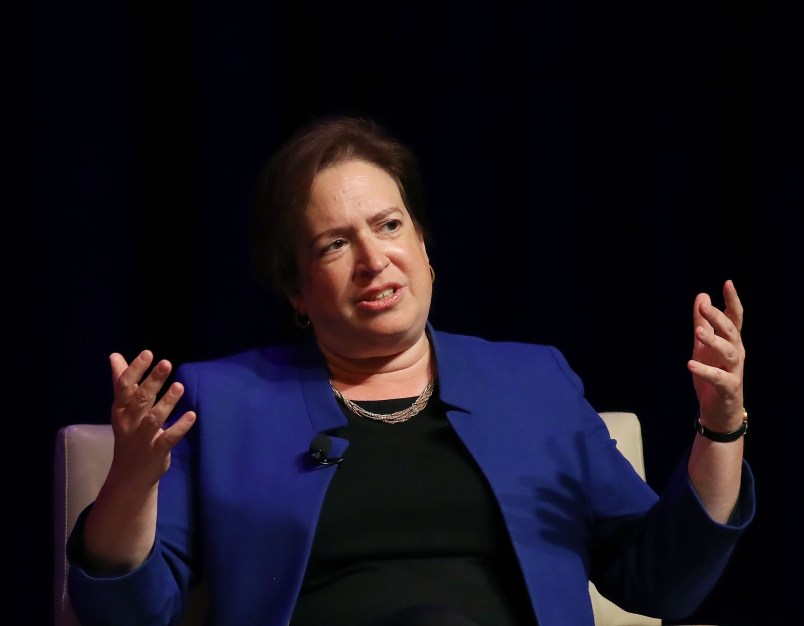Justice Elena Kagan issued a blistering dissent Wednesday that argued that the Supreme Court’s conservative majority — in a union fees case, as well as other recent decisions — was “weaponizing the First Amendment.”
“Today is not the first time the Court has wielded the First Amendment in such an aggressive way. And it threatens not to be the last,” Kagan warned in the dissent, where she was joined by the three other liberal justices.
“Speech is everywhere—a part of every human activity (employment, health care, securities trading, you name it). For that reason, almost all economic and regulatory policy affects or touches speech,” she wrote. “So the majority’s road runs long. And at every stop are black-robed rulers overriding citizens’ choices. The First Amendment was meant for better things.”
Her dissent came in Janus v. American Federation of State, County, and Municipal Employee, which was a challenge to a scheme that allowed public employee unions to collect so-called “agency fees” — for activities like contract negotiations that benefited the entire workforce — from non-union members of a union shop who declined to pay full union dues.
The majority, in an opinion written by Justice Samuel Alito, overturned the 41-year-old Supreme Court decision in Abood v. Detroit Board of Education that upheld the agency-fees system, which is meant to address the free-rider problem of non-union members benefiting from union activities without helping fund them.
Wednesday’s decision was no surprise. Alito had for years hinted that he would like to revisit Abood, and it seemed likely to be overturned in a case similar to Janus in 2016 until Justice Antonin Scalia died, depriving the court’s conservatives of their crucial fifth vote.
Kagan, in her dissent noted that with Wednesday’s decision “the majority proudly lays claim to its 6-year crusade to ban agency fees.”
Much of her dissent focused on the “havoc” the court wrought by overturning precedent that had created “entrenched legislative and contractual arrangements.”
She noted that up until now it had been up to states whether to allow public union agency fees, with about 28 prohibiting them and 22 authorizing them.
“Abood provided a workable standard for courts to apply. And Abood has generated enormous reliance interests,” Kagan said. “The majority has overruled Abood for no exceptional or special reason, but because it never liked the decision. It has overruled Abood because it wanted to. Because, that is, it wanted to pick the winning side in what should be—and until now, has been—an energetic policy debate. ”
The court chose the “winners” on Wednesday, Kagan said, by “turning the First Amendment into a sword, and using it against workaday economic and regulatory policy.”
Kagan argued that was a larger trend, pointing to the Supreme Court’s recent 5-4 decision, on First Amendment grounds, knocking down California’s requirement that anti-abortion pregnancy care centers inform visitors that they lack medical licensing.
There was “no sugarcoating” the union fees opinion, she wrote.
“The majority overthrows a decision entrenched in this Nation’s law— and in its economic life—for over 40 years,” she wrote. “As a result, it prevents the American people, acting through their state and local officials, from making important choices about workplace governance.”
Read her dissent, starting on page 56, below:







No kidding! It looks like they are headed toward turning the First Amendment into an assault weapon! A weapon of mass destruction . . .of our country and our freedoms.
Anyone who thinks Republicans look upon free riders as a problem does not understand Republicans.
While gun-grabbing speech from the Red Hen restaurant.
Its a wonder Fred Phelps and his congregation wasn’t there to protest with the rest of the goofs who showed up.
They’ve been trying to do this for decades, especially so they could use religion to justify discrimination.
Indeed. The only free rider a Republican doesn’t like is the one who isn’t him, because that other guy is cutting into what’s available for his own free ride.